Available Copies from Independent Booksellers
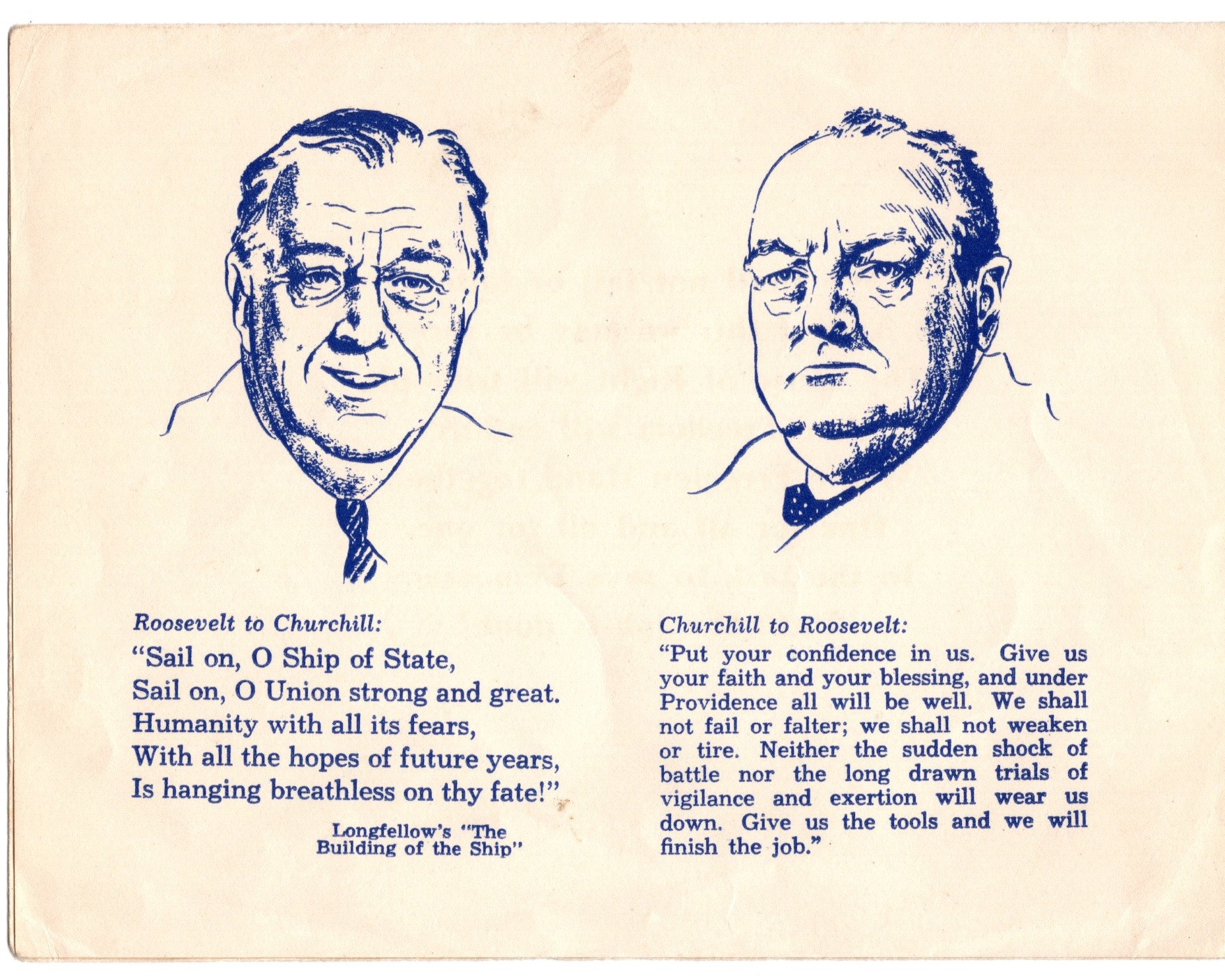
Price: US$150.00 + shipping
Description: This intriguing bit of Second World War ephemera is an original Second World War card, produced in Canada, undated but presumably produced in 1941. The card features images and quotes from U.S. President Franklin D. Roosevelt and British Prime Minister Winston S. Churchill.The card is printed on a single sheet measuring 12.5 x 9.5 inches folded once horizontally and once vertically to form panels of 6.25 x 4.75 inches. On the cover panel, in red, blue, and gold, are printed American and British flags with an encircled maple leaf medallion between them reading "GREETINGS FROM CANADA". Above the medallion are two clasped hands and above that an arched proclamation "UNITED WE STAND". On the left interior panel are images of Roosevelt and Churchill. Below Roosevelts image is the Longfellow quote he sent to Churchill on 27 January 1941 and below Churchills image is his 9 February reply to Roosevelt. On the right interior panel is an unattributed quote "We shall not fail or falter, | And of this we may be sure: | The cause of Right will triumph | And Freedom will endure | While Freemen stand together, | One for all and all for one, | In the task to save Democracy | Until the job is done!" On the rear panel is printed "MADE IN CANADA". Condition of this card is very good, modestly worn and wrinkled but complete and respectably clean. On the lower right interior panel is written "To Edie & Arthur | From Bee." On the lower right rear panel is written "34122".On Saturday, February 8th, the U.S. House of Representatives passed the Lend-Lease Bill by 260 to 165 Votes. It had yet to pass the Senate and be signed by President Roosevelt, but a major hurdle absolutely crucial to the British had been passed. Churchill learned of the welcome news at Chequers (the country residence of the British prime minister) and later that day received a farewell visit from Harry Hopkins, President Roosevelt's emissary and a critical advocate and shaper of the Lend Lease Program. Hopkins discussed with Churchill many points in this speech that Churchill would deliver the following evening, which Hopkins noted had 'American public opinion' as 'the principle [sic] target'. (Gilbert, Vol. VI, pp. 1007-09) Churchill's February 9 broadcast to Britain and the Empire was his first broadcast for five months. Near the end of his remarks, Churchill quoted verse from a Longfellow poem which President Roosevelt had written out in his own hand and sent to Churchill on January 27: "Sail on, O Ship of State! | Sail on, O Union, strong and great! | Humanity with all its fears, | With all the hopes of future years, | Is hanging breathless on thy fate." Churchill concluded with his answer to President Roosevelt: "Put your confidence in us. Give us your faith and your blessing, and under Providence all will be well. We shall not fail or falter; we shall not weaken or tire. Neither the sudden shock of battle nor the long-drawn trials of vigilance and exertion will wear us down. Give us the tools and we will finish the job." The quotes on the left interior panel of this card are from this exchange between Roosevelt and Churchill.The United States enacted the Lend Lease Act in early March and soon thereafter extended its naval security zone several thousand miles into the Atlantic, effectively shielding much of the Atlantic convoy route.
Seller: Churchill Book Collector ABAA/ILAB/IOBA, San Diego, CA, U.S.A.
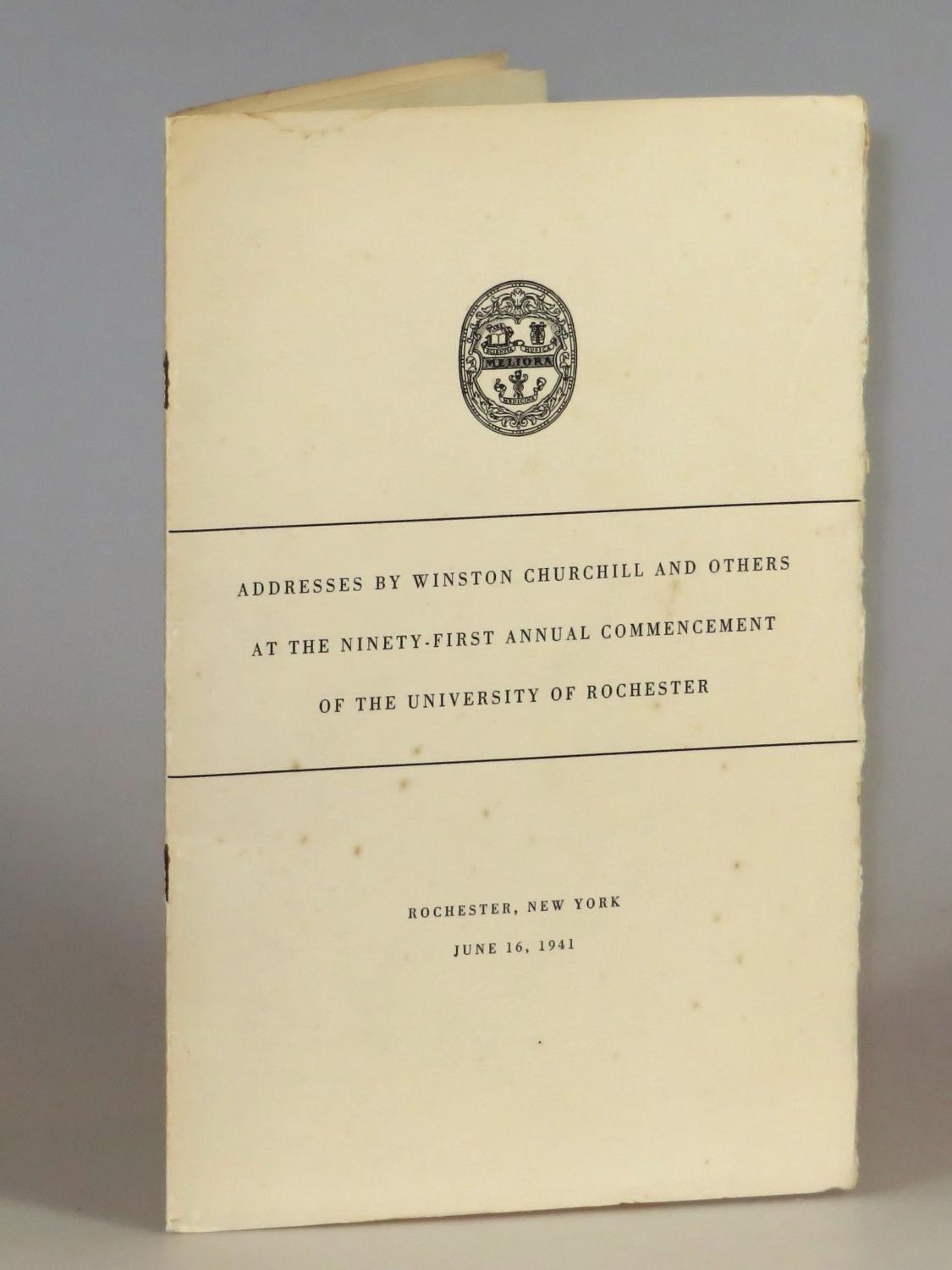
Price: US$200.00 + shipping
Description: This scarce pamphlet is the first published appearance of Winston S. Churchill's speech of 16 June 1941, early in Churchills Second World War premiership and nearly half a year before the United States formally entered the war. The speech was broadcast from 10 Downing Street on the occasion of Churchill receiving an Honorary Degree of Laws from the New York State's University of Rochester. Churchill had assumed the Premiership just a year earlier on 10 May 1940. By 16 June 1941, Churchill had led his nation for a frightful, solitary year since the fall of France. Britain would continue to stand alone against Hitler's Germany until the United States formally entered the Second World War after the 7 December 1941 attack on Pearl Harbor.Courting American empathy and support was of critical importance. In particular, severe merchant shipping losses to German U-Boats in April and May of 1941 were a spur "to press continually for a wider American contribution to Britain's war effort." (Gilbert, Vol. VI, p.111) Churchill's speeches conveyed the political determination of the British government and steadfastness of the British people to an American nation not yet fully engaged in the war. Given that Churchills mother was born in Rochester and Franklin Delano Roosevelt had served as Governor of New York State, this Broadcast address to a New York University, which might otherwise seem obscure, was a timely opportunity.In his speech Churchill spoke of "sense of kinship and of unity", and of his ancestral connection to Rochester. Nearly every sentence of Churchill's remarks limned common heritage, values, and purpose, all the while conveying British resolve to prevail: "For more than a year, we British have stood alone uplifted by your sympathy and respect, sustained by our own unconquerable will power and by the increasing growth and hopes of your massive aid. Whatever happens, we shall endure to the end." This speech was eventually published in His Complete Speeches as "The Old Lion".The title comes from the speech's penultimate paragraph: Now the old lion. stands alone against hunters who are armed with deadly weapons and impelled by desperate and destructive rage." The speech concludes striking the balance between Britain's resolve and urgent need: ".time is short. Every month that passes adds to the length and the perils of the journey that will have to be made. United we can save and guide the world." Clearly, the intended American audience was broader than Rochester. Four days later, on 20 June, Churchill telegraphed Roosevelt thanking him for establishment of trans-Atlantic "Ferry Service" using American Army pilots and American-manned staging posts with servicing facilities and assuring the President that "There will be no weakening here."The pamphlet measures 9.25 x 6 inches (23.5 x 15.25 cm), bound in wire-stitched, laid watermarked card wraps, both the front wrap and contents with untrimmed edges. The contents number 23 pages. Churchill's full address is printed at pages 7-9, preceded by his portrait photograph at page 6. The balance of the pamphlet contains a Foreword, the degree presentation by University President Alan Valentine, excerpts from an address by Eve Curie (daughter of Marie Curie), excerpts from an address by Robert P. Patterson (Roosevelt's Under Secretary of War), and a list of honorary degrees conferred in 1941.Condition is very good plus. The covers are complete and firmly attached, both binding staples rusted but tight. The covers show light soiling and spotting. This is an elusive item. This copy survived proximate to its source, coming to us courtesy of an upstate Upstate New York bookseller.Reference: Cohen D80, Woods D(b)53/1.
Seller: Churchill Book Collector ABAA/ILAB/IOBA, San Diego, CA, U.S.A.

Price: US$250.00 + shipping
Description: This is the first edition, only printing of Churchill's January 9, 1941 speech to the Pilgrims Society (referred to as "the Pilgrims" in the title on the cover) welcoming Lord Halifax as British Ambassador to the United States. Founded in 1902, the Pilgrims Society is an Anglo-American organization whose objective is "the encouragement of Anglo-American good fellowship" a fellowship acutely vital to Britain in January 1941.The folded, four-panel leaflet measures 6 x 9 inches (15.2 x 22.9 cm), the speech printed on the first three pages. Condition is near-fine. The leaflet is complete with virtually no wear. We note slight age-toning to the perimeter and a hint of spotting along the lower left edge of the front cover and two small spots on the rear cover. The leaflet is protected within a clear, removable, archival mylar sleeve.Edward Frederick Lindley Wood, 1st Earl of Halifax (1881-1959) became British Ambassador to the United States after the sudden death of Lord Lothian in December 1940. Halifax, then the Foreign Secretary, was appointed only after both Lloyd George and Oliver Lyttelton had been considered, and is an example of the many personalities and considerations Churchill balanced in his wartime coalition government. In choosing the architect of Chamberlain's appeasement policy as ambassador to the one nation Britain most desperately needed to join the war, Churchill is reported as reasoning that Halifax "would never live down his reputation for appeasement which he and the Foreign Office had won themselves" and that "He had no future in this country. On the other hand he had a glorious opportunity in America, for, unless the United States came into the war, we could not win, or at least we could not win a really satisfactory peace." (Gilbert, Volume VI, pages 952-953) Halifax reluctantly accepted the appointment, allowing the return of Anthony Eden to the Foreign Secretary post, which he had resigned in 1938 in opposition to Chamberlain's appeasement policy. Halifax served as Ambassador to the U.S. until May 1946. In this address to the Pilgrims Society, Churchill calls Halifax "a man of light and learning" and, perhaps anticipating the effect of his new ambassador's pro-appeasement history, Churchill says: "I have often disagreed with him in the twenty years I have known him, but I have always respected him and his actions because I know that courage and fidelity are the essence of his being." Of the critical relationship between Britain and America, Churchill states: "The identity of purpose and persistence of resolve prevailing throughout the English-speaking world will, more than any other single fact, determine the way of life which will be open to generations, and perhaps to centuries, which follow our own."This leaflet is one in a series of Churchill's speeches printed by the British Library of Information in New York. The British Library of Information published thirty-four editions of statements, speeches, and broadcast addresses by Prime Minister Winston Churchill (that number including some variant publications of the same speeches), beginning with his first speech as Prime Minister of 13 May 1940 and ending with the broadcast address of 29 November 1942. These editions were often issued within two or three days of delivery and "reveal the political determination of the British government to bring the inspiration and steadfastness of the Prime Minister and the British nation to an American nation not yet engaged in the war. Indeed, twenty-two of the BLOI speech pamphlets were published before Pearl Harbor." (Cohen, Volume I, p.513, A120)Reference: Cohen A139, Woods A65
Seller: Churchill Book Collector ABAA/ILAB/IOBA, San Diego, CA, U.S.A.

Price: US$250.00 + shipping
Description: This is the first edition, only printing, of Churchill's 18 March 1941 address to the Pilgrims Society (erroneously printed as "Pilgrim Society" on the leaflet cover). Founded in 1902, the Pilgrims Society is an Anglo-American organization whose objective is "the encouragement of Anglo-American good fellowship". Churchill addressed the Pilgrims Society on 18 March to welcome the new American Ambassador to the United Kingdom, John. G. Winant, in the wake of the passage of the Lend-Lease Act by the U.S. Congress. "We welcome you here, Mr. Winant, at a moment when the great battle in which your government and nation are deeply interested is developing its full scope and severity. Mr. Winant, you come to us at a grand turning point in the world's history."The folded, four-panel leaflet measures 6 x 9 inches (15.2 x 22.9 cm). Condition is near-fine. The paper is bright with virtually no wear. We note only a hint of soiling along the left and bottom edges and a small rust stain at the lower left front cover where it apparently lay against another pamphlet, causing light offsetting. The leaflet is protected within a clear, removable, archival mylar sleeve.John "Gil" Gilbert Winant (1889-1947) was the 45th U.S. Ambassador to the United Kingdom. He succeeded the pro-appeasement Joseph Kennedy and marked a decidedly different, pro-Britain, pro-alliance perspective than his predecessor. Upon arriving in England on 2 March 1941, Winant announced "I'm very glad to be here. There is no place I'd rather be at this time than in England." Churchill would conclude his 18 March 1941 welcoming remarks to Winant "You, Mr. Ambassador, share our purpose. You'll share our dangers. You'll share our interests. You shall share our secrets. And the day will come when the British Empire and the United States will share together the solemn but splendid duties which are the crown of victory."Less than nine months after Churchill gave this speech, Winant was with Churchill when the latter learned of the attack on Pearl Harbor, precipitating formal U.S. entry into the war. Winant would serve as U.S. Ambassador until 1946. Winant reportedly had an affair with Churchill's daughter, Sarah. Both of Winant's sons served in WWII, John. Jr. as a B-17 pilot in the Eighth Air Force who became a prominent German prisoner of war.This leaflet is one in a series of Churchill's speeches printed by the British Library of Information in New York. The British Library of Information published thirty-four editions of statements, speeches, and broadcast addresses by Prime Minister Winston Churchill (that number including some variant publications of the same speeches), beginning with his first speech as Prime Minister of 13 May 1940 and ending with the broadcast address of 29 November 1942. These editions were often issued within two or three days of delivery and "reveal the political determination of the British government to bring the inspiration and steadfastness of the Prime Minister and the British nation to an American nation not yet engaged in the war. Indeed, twenty-two of the BLOI speech pamphlets were published before Pearl Harbor." (Cohen, Volume I, p.513, A120)Reference: Cohen A144, Woods A68
Seller: Churchill Book Collector ABAA/ILAB/IOBA, San Diego, CA, U.S.A.
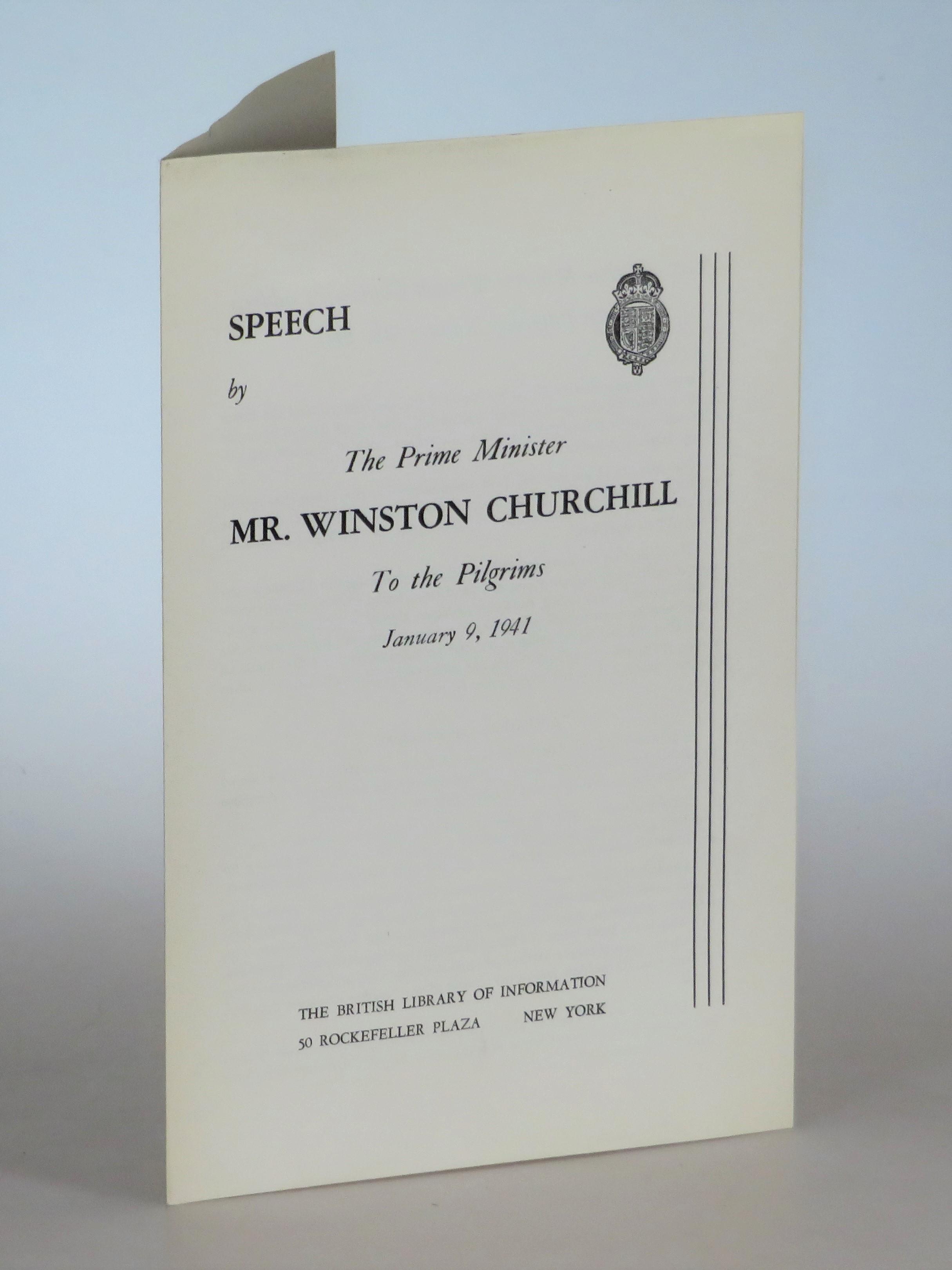
Price: US$275.00 + shipping
Description: This is the first edition, only printing of Churchill's January 9, 1941 speech to the Pilgrims Society (referred to as "the Pilgrims" in the title on the cover) welcoming Lord Halifax as British Ambassador to the United States. Founded in 1902, the Pilgrims Society is an Anglo-American organization whose objective is "the encouragement of Anglo-American good fellowship".This first edition, only printing of Churchill's January 9, 1941 speech is a four-page folded paper leaflet measuring 9 x 6 inches (22.9 x 15.2 cm) and printed on the first three pages. This example is in near fine condition, particularly given the age and inherent fragility of the format. The pamphlet is crisp and complete, with no spotting, no previous ownership marks, and no appreciable wear. Minor toning shows at the perimeter of the covers, trivial soiling at the top edges of the covers. The leaflet is protected within a removable, clear, archival mylar sleeve. Edward Frederick Lindley Wood, 1st Earl of Halifax (1881-1959) became British Ambassador to the United States after the sudden death of Lord Lothian in December 1940. Halifax, then the Foreign Secretary, was appointed only after both Lloyd George and Oliver Lyttelton had been considered, and is an example of the many personalities and considerations Churchill balanced in his wartime coalition government. In choosing the architect of Chamberlain's appeasement policy as ambassador to the one nation Britain most desperately needed to join the war, Churchill is reported as reasoning that Halifax "would never live down his reputation for appeasement which he and the Foreign Office had won themselves" and that "He had no future in this country. On the other hand he had a glorious opportunity in America, for, unless the United States came into the war, we could not win, or at least we could not win a really satisfactory peace." (Gilbert, Volume VI, pages 952-953) Halifax reluctantly accepted the appointment, allowing the return of Anthony Eden to the Foreign Secretary post, which he had resigned in 1938 in opposition to Chamberlain's appeasement policy. Halifax served as Ambassador to the U.S. until May 1946. In this address to the Pilgrims Society, Churchill calls Halifax "a man of light and learning" and, perhaps anticipating the effect of his new ambassador's pro-appeasement history, Churchill says: "I have often disagreed with him in the twenty years I have known him, but I have always respected him and his actions because I know that courage and fidelity are the essence of his being." Of the critical relationship between Britain and America, Churchill states: "The identity of purpose and persistence of resolve prevailing throughout the English-speaking world will, more than any other single fact, determine the way of life which will be open to generations, and perhaps to centuries, which follow our own." This pamphlet is one in a series of Churchill's speeches printed by the British Library of Information in New York. The British Library of Information published thirty-four editions of statements, speeches, and broadcast addresses by Prime Minister Winston Churchill (that number including some variant publications of the same speeches), beginning with his first speech as Prime Minister of 13 May 1940 and ending with the broadcast address of 29 November 1942. These editions were often issued within two or three days of delivery and "reveal the political determination of the British government to bring the inspiration and steadfastness of the Prime Minister and the British nation to an American nation not yet engaged in the war. Indeed, twenty-two of the BLOI speech pamphlets were published before Pearl Harbor." (Cohen, Volume I, p.513, A120)Reference: Cohen A139, Woods A65
Seller: Churchill Book Collector ABAA/ILAB/IOBA, San Diego, CA, U.S.A.
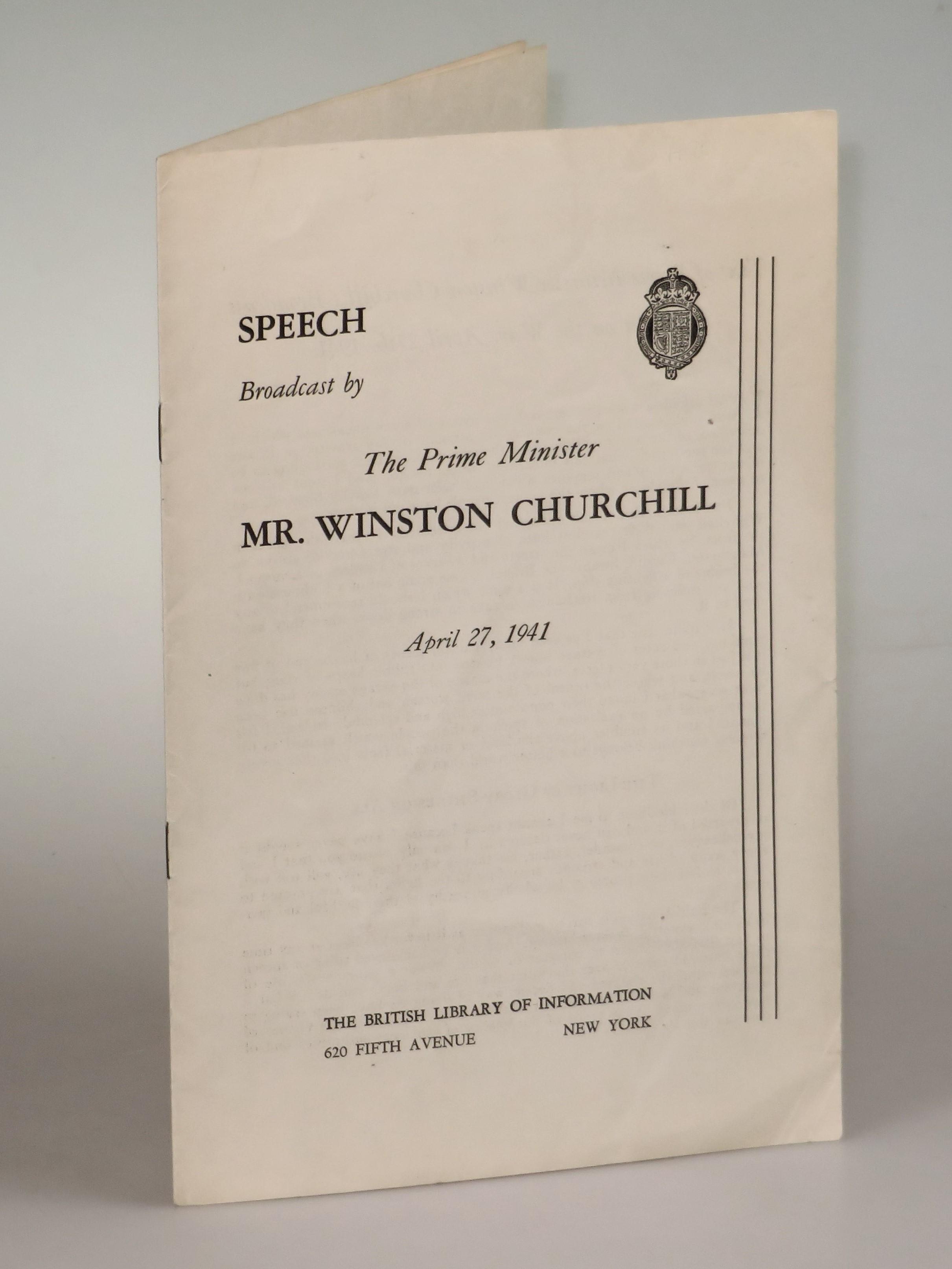
Price: US$350.00 + shipping
Description: This is the first edition, only printing of Churchill's broadcast speech of 27 April 1941 - Churchill's famous "Westward, Look, the Land is Bright" speech in which he praises the resolve and heroism of the British people. Condition is near fine and impressive thus given the fragility of the format. The pamphlet is crisp and complete, both binding staples intact with only slight surface corrosion. The covers show only light overall age-toning and minor creasing to the lower front corner. The pamphlet is protected within a clear, removable archival sleeve. Churchill made the broadcast from Chequers, a rousing and reasoned reassurance to the British people delivered during retreat and evacuation from Greece under General Wavell. Churchill spoke of having recently visited "some of our great cities and seaports which had been most heavily bombed" and finding that "where the ordeal of the men, women and children has been most severe . I found their morale most high and splendid." Typically, even as he spoke of "an exaltation of spirit in the people" Churchill mixed practical information on the war and admonition that "There is only one thing certain about war, that it is full of disappointments and also of mistakes." Churchill spoke of fronts in Greece, Yugoslavia, Libya, and the Atlantic and of increased American commitment and support. The United States had recently passed the Lend Lease Act and extended its naval security zone several thousand miles into the Atlantic, effectively shielding much of the Atlantic convoy route. Churchill placed recent challenges in context, stating "Nothing that is happening now is comparable in gravity with the dangers through which we passed last year." Churchill famously concluded his remarks with eight lines of verse from a poem by Arthur Hugh Clough that Churchill first heard and learned by heart before the First World War. (Gilbert, Volume VI, p.1022). The moving words provided the title by which this speech came to be known. As a token of esteem, Charles Scribner, Churchill's former American publisher, located the manuscript version of the poem ("Say Not the Struggle Nought Availeth") and arranged to have it presented to Churchill in July 1941. (Cohen, Volume I, pages 570-571) This leaflet is one in a series of Churchill's speeches printed by the British Library of Information in New York. The British Library of Information published thirty-four editions of statements, speeches, and broadcast addresses by Prime Minister Winston Churchill (that number including some variant publications of the same speeches), beginning with his first speech as Prime Minister of 13 May 1940 and ending with the broadcast address of 29 November 1942. These editions were often issued within two or three days of delivery and "reveal the political determination of the British government to bring the inspiration and steadfastness of the Prime Minister and the British nation to an American nation not yet engaged in the war. Indeed, twenty-two of the BLOI speech pamphlets were published before Pearl Harbor." (Cohen, Volume I, p.513, A120)Reference: Cohen A145, Woods A70
Seller: Churchill Book Collector ABAA/ILAB/IOBA, San Diego, CA, U.S.A.

Price: US$500.00 + shipping
Description: This is a quite rare wartime speech pamphlet featuring Churchill's "Give us the tools and we will finish the job" speech of February 9, 1941. Churchill's speech is published here with one other - Canadian Prime Minister Mackenzie King's February 2, 1941 message broadcast to the people of Canada. On Saturday, February 8th, the U.S. House of Representatives passed the Lend-Lease Bill by 260 to 165 Votes. It had yet to pass the Senate and be signed by President Roosevelt, but a major hurdle absolutely crucial to the British had been passed. Churchill learned of the welcome news at Chequers (the country residence of the British prime minister) and later that day received a farewell visit from Harry Hopkins, President Roosevelt's emissary and a critical advocate and shaper of the Lend Lease Program. Hopkins discussed with Churchill many points in this speech that Churchill would deliver the following evening, which Hopkins noted had 'American public opinion' as 'the principle [sic] target'. (Gilbert, Vol. VI, pp. 1007-09) Churchill's February 9 broadcast to Britain and the Empire was his first broadcast for five months. Near the end of his remarks, Churchill quoted verse from a Longfellow poem which President Roosevelt had written out in his own hand and sent to Churchill on January 27: "Sail on, O Ship of State! | Sail on, O Union, strong and great! | Humanity with all its fears, | With all the hopes of future years, | Is hanging breathless on thy fate." Churchill concluded with his answer to President Roosevelt: "Put your confidence in us. Give us your faith and your blessing, and under Providence all will be well. We shall not fail or falter; we shall not weaken or tire. Neither the sudden shock of battle nor the long-drawn trials of vigilance and exertion will wear us down. Give us the tools and we will finish the job." The United States enacted the Lend Lease Act in early March and soon thereafter extended its naval security zone several thousand miles into the Atlantic, effectively shielding much of the Atlantic convoy route. This speech pamphlet is unusual in several respects - its publication, its survival, and its superlative condition. Per Churchills bibliographer, Ronald Cohen (pages 530-32), the publisher - Universal Life Assurance and Annuity Company - was in business from 1902 to 1942. In an exuberant surge of patriotism, the company published over 40 booklets in the "Universal Life for Victory Series", a few of which were speeches by Churchill. Apparently, there were copyright concerns in the office of the Prime Minister, as well as with his British and Canadian publishers. Prickly correspondence was exchanged, but also some correspondence recognizing the propaganda value of Universal Life's efforts. Eventually the matter was closed. This copy, a noteworthy survivor, is in exceptional, truly fine condition. The pamphlet is bound in wire-stitched paper wraps, measures 6 inches x 3.5 inches (15.2 x 8.9 cm), and is 32 pages in length. Churchill's speech occupies all of pages 3 through 17, with excerpts from Roosevelt's message to Churchill and Churchill's reply at page 2, and excerpts from Churchill's June 4, 1940 speech at page 18 under the heading "A Briton's Creed." The paper wraps remain bright, clean, complete, and firmly attached. The binding staples remain firm and show no corrosion. The contents are pristine. The pamphlet is protected in a removable, archival mylar sleeve. Reference: Cohen A143.5
Seller: Churchill Book Collector ABAA/ILAB/IOBA, San Diego, CA, U.S.A.
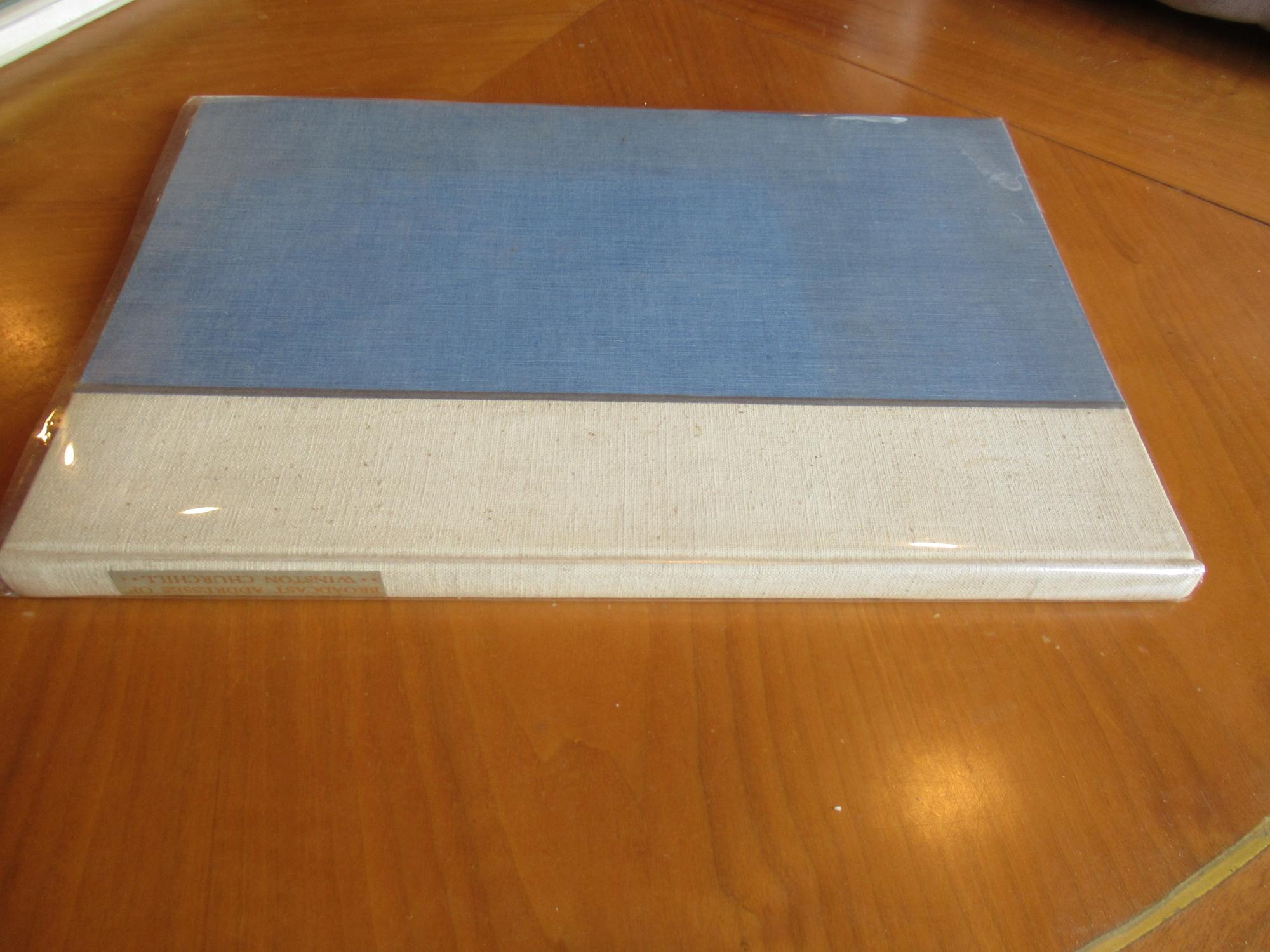
Price: US$675.00 + shipping
Condition: Fine
Description: First Printing In Book Form Of The Prime Minister's Famous War Speeches. One Of 250 Copies Printed By The Grabhorns (For Ransohoffs, San Francisco). White Linen Spine With Gilt Leather Spine Label, And Blue Cloth Boards. Finely Printed By The Grabhorns On Fine Paper With Deckled Edges. 16" X 10 3/4". A Fine Copy, No Wear Or Foxing Or Stains, Spine Label Complete And With Brilliant Gilt. Traces Of Rubbing Right Along Top And Bottom Edges Of Boards. Clear Dj Is 3/16" Taller Than Book, No Wear Or Tears Or Chips.
Seller: Arroyo Seco Books, Pasadena, Member IOBA, Pasadena, CA, U.S.A.

Churchill, Winston. Broadcast Addresses to the People of Great Britain. 1940-1941.. , 1941.
Price: US$775.00 + shipping
Description: CHURCHILL, Winston S. Broadcast Addresses to the People of Great Britain, Italy, Poland, Russia and the United States. [6], 57, [2] pp., arms of Great Britain on half-title. Folio, 404 x 274 mm, bound in recent half morocco. San Francisco: Printed for Ransohoffs by the Grabhorn Press, 1941. This Fine Grabhorn Press Edition prints six important speeches of Winston Churchill delivered at the onset of World War II. The dates of the broadcasts range from December 23, 1940 to June 22, 1941, and thereby represent crucial communications from England to the Italian peoples, the British Nation and Empire, a broadcast to Polish peoples around the world, two general reports on the War, and a report on the Atlantic Meeting. Limited to 250 copies, printed in blue and black on hand-made paper. With large six-line initials in gold and blue and the blue and gold crest of England on the half-title. Being printed by the Grabhorn's within months of the final broadcast, this publication has to be one of the earliest to appear either in this country or England, and it is certainly the most elegantly printed of any subsequent edition. Woods D(a)8, containing Addresses A63, A67, A70, A71, A74, A76 (c).
Seller: Ursus Rare Books, New York, NY, U.S.A.
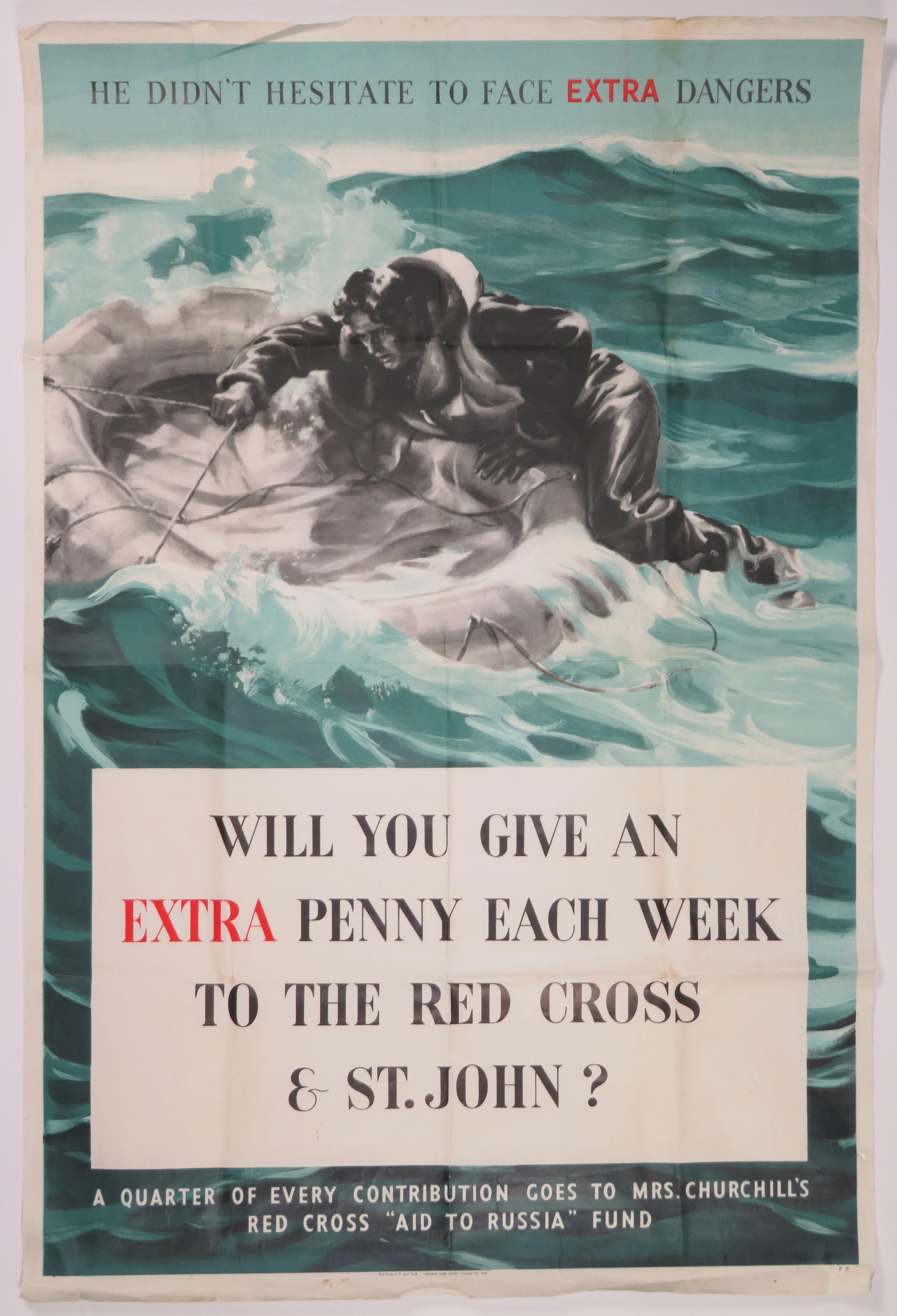
Price: US$1000.00 + shipping
Description: This original poster from early during the Second World War testifies to both the British wartime alliance with Russia and the important role played by Prime Minister Winston Churchills wife, Clementine, in rallying material and moral public support for that wartime alliance.This circa 1941 poster measures roughly 20 x 30 inches (50 x 75 cm). Printed in blue, black and red on thin white stock, the poster is both striking and perishable. This is the first copy we have offered. The image is of a sailor clambering into a life raft below the printed headline "HE DIDNT HESITATE TO FACE EXTRA DANGERS" (with "EXTRA" in red print). The image was topical given the tremendous shipping losses to U-boats, the cost of sustaining Britain - and of Britain sending material aid to Russia. Centered below the image is a large white box with black print "WILL YOU GIVE AN | EXTRA PENNY EACH WEEK | TO THE RED CROSS | & ST. JOHN?" The "EXTRA" in red echoes that in the headline. Below the box, printed in white on the illustrated stormy blue sea background, is the statement "A QUARTER OF EVERY CONTRIBUTION GOES TO MRS. CHURCHILLS | RED CROSS "AID TO RUSSIA" FUND". Diminutive print in the bottom white center margin reads "Red Cross & St John Fund, registered under the War Charities Act, 1940" with "F.7." printed at the lower right. Condition of the poster approaches very good. The poster remains complete and unrestored, the colors vivid, the surface respectably clean. Minor wear and wrinkling to extremities are substantially confined to the margins. There are six fold lines, three horizontal and three vertical, ostensibly from original mailing. Though undated, this poster almost certainly dates from 1941. The Second World War alliance between Britain and the Soviet Union was essential but uneasy. Hitlers Germany and Stalins Russia signed the Molotov-Ribbentrop Pact on 23 August 1939, promising mutual non-aggression. On 22 June 1941 the Pact was unceremoniously terminated when Nazi forces invaded the Soviet Union. Churchill, long a vehement anti-communist, nevertheless embraced the exigent practicality of wartime alliance with the Soviets and on 12 July 1941 the Anglo-Soviet Agreement was signed.Churchills wife, Clementine, added a human dimension to an alliance born of necessity. In 1941 the Aid to Russia fund was set up with Clementine as the chairman. Among the various fundraising methods was a "penny-a-week fund. Wage earners were given the option of volunteering a penny a week deducted from their pay . Within just 12 days £370,000 had been raised." By wars end, the Fund raised nearly £8,000,000 and provided clothing, blankets, medical supplies and other items to the Soviet Red Cross. "To amass such support from a country which was itself struggling with wartime shortages was a considerable achievement." The effort was intensely personal for Clementine. "Many who sent in letters with donations received personal, signed replies Clementine even took the time to thank all the school children who contributed " (National Trust & International Churchill Society) At the close of the Second World War, Clementine made a tour of Soviet hospitals that had been helped by her British Red Cross Aid to Russia Fund.For five weeks, from late March to early May 1945, Clementine journeyed throughout the Soviet Union. Clementine was still in Russia on V-E Day; her husband "wrote a speech for her to deliver via broadcast to the Russian people in celebration of the Allied victory: "It is my firm belief that on the friendship and understanding between the British and Russian peoples depends the future of mankind."" (Gilbert, Vol. VII, p. 1350) Her efforts had been significant and her sentiments were laudably hopeful, but charity and sentiment were not enough to overcome fundamentally different British and Russian conceptions of the nature of postwar rights and freedoms and the intractable conflicts that resulted.
Seller: Churchill Book Collector ABAA/ILAB/IOBA, San Diego, CA, U.S.A.
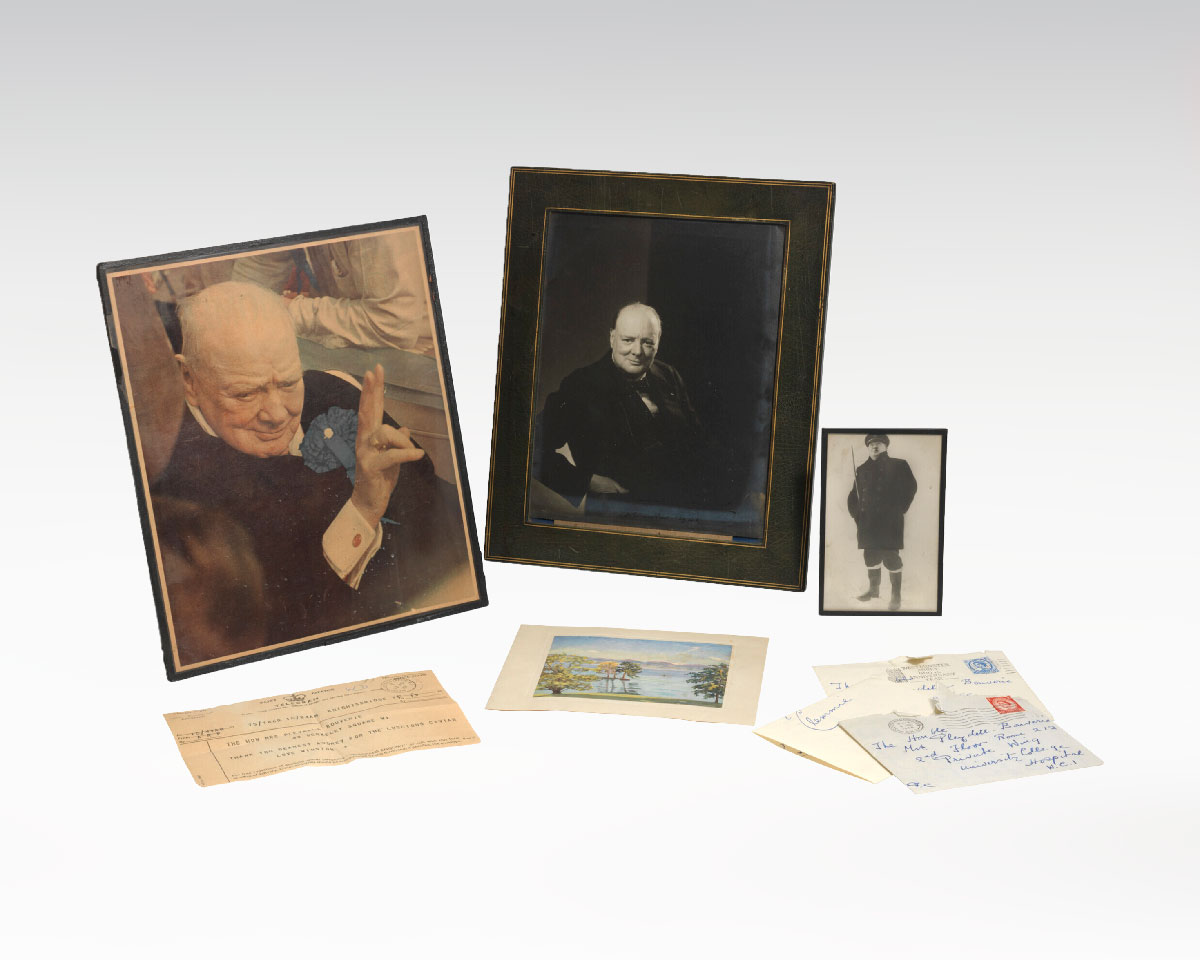
Price: US$12800.00 + shipping
Description: Portrait photograph of Winston Churchill, taken by Edward Steichen, signed as prime minister, "Winston S. Churchill November 1940." With two portrait photographs of Churchill and a telegram from Churchill to Audrey Pleydell-Bouverie, 23 November 1961 "Thank you dearest Audrey for the luscious caviar love Winston." With three autographed letters from Clementine Churchill and one autograph Christmas card signed to Audrey Pleydell-Bouverie, 7 June 1956, 1 January 1959, 31 December 1965 and n.d., in 1956 enquiring after her recovery from an operation, otherwise sending thanks (including for an 'original and amusing cigar lighter') and greetings and mentioning Winston; with two envelopes. The signed photograph is housed in a green morocco frame by Sangorski & Sutcliffe. An exceptional collection. Following the resignation of Neville Chamberlain on May 10th 1940, Winston S. Churchill became Prime Minister of England and took the lead in warning about Nazi Germany and in campaigning for rearmament. His speeches and radio broadcasts helped inspire British resistance, especially during the difficult days of 1940â"41 when the British Commonwealth and Empire stood almost alone in its active opposition to Adolf Hitler. A non-academic historian, artist, and prolific writer, Churchill won the Nobel Prize in Literature in 1953 for his overall, lifetime body of work.
Seller: Raptis Rare Books, Palm Beach, FL, U.S.A.